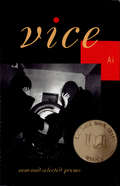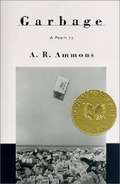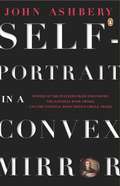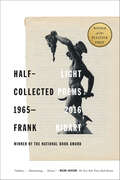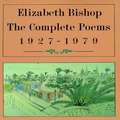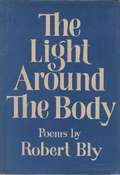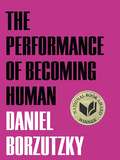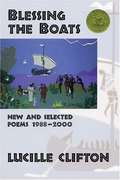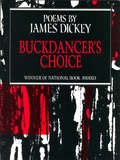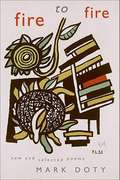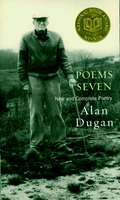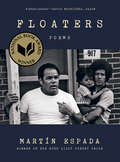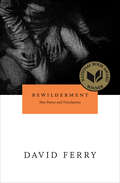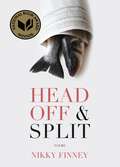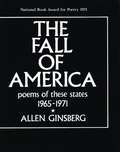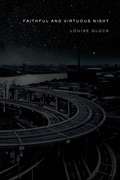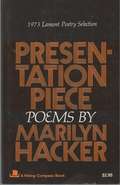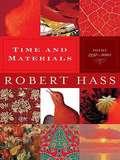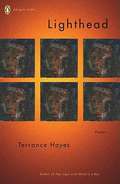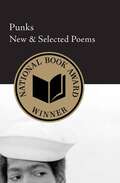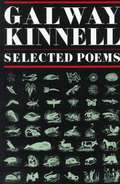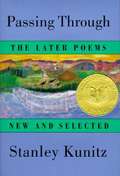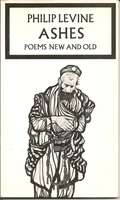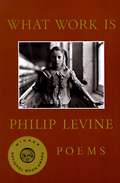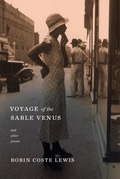Special Collections
National Book Award Winners - Poetry
- Table View
- List View
Vice
by AiCollected here are poems from Ai's previous five books--Cruelty, Killing Floor, Sin, Fate, and Greed--along with seventeen new poems. Employing her trademark ferocity, these new dramatic monologues continue to mine this award-winning poet's "often brilliant" (Chicago Tribune) vision.
Winner of the National Book Award
Garbage
by A. R. AmmonsA book-length poem, "Garbage" is an epic of ideas: all life -- not that of human beings alone, but every species -- is shown to be part of an ultimate reality. Eternity is here and now. The argument ranges widely with a wealth of images taken from science, and the world around us, the writing by turns impassioned and witty.
Winner of the National Book Award
Self-Portrait in a Convex Mirror
by John AshberyA collection of poetry by John Ashbery.
Winner of the National Book Award.
Pulitzer Prize Winner
Half-Light
by Frank BidartGathered together, the poems of Frank Bidart perform one of the most remarkable transmutations of the body into language in contemporary literature. His pages represent the human voice in all its extreme registers, whether it’s that of the child-murderer Herbert White, the obsessive anorexic Ellen West, the tormented genius Vaslav Nijinsky, or the poet’s own.
Winner of the 2018 Pulitzer Prize for Poetry
The Complete Poems 1927-1979
by Elizabeth BishopFrom the book: "So many stops and looks But never any listens For a poor man who traps A snowstorm that glistens."
The Performance Of Becoming Human
by Daniel BorzutzkyFollowing in the path of his acclaimed collections THE BOOK OF INTERFERING BODIES (Nightboat, 2011) and IN THE MURMURS OF THE ROTTEN CARCASS ECONOMY (Nightboat, 2015), Daniel Borzutzky returns to confront the various ways nation-states and their bureaucracies absorb and destroy communities and economies.
In THE PERFORMANCE OF BECOMING HUMAN, the bay of Valparaiso merges into the western shore of Lake Michigan, where Borzutzky continues his poetic investigation into the political and economic violence shared by Chicago and Chile, two places integral to his personal formation. To become human is to navigate borders, including the fuzzy borders of institutions, the economies of privatization, overdevelopment, and underdevelopment, under which humans endure state-sanctioned and systemic abuses in cities, villages, deserts.
National Book Award Winner
Blessing the Boats
by Lucille CliftonThis long-awaited collection from one of the most distinguished poets working today includes new poems written during the past four years as well as generous selections from previous collections.
Winner of the National Book Award
Buckdancer's Choice
by James DickeyWhoever looks to a new book by James Dickey for further work in an established mode, or for mere novelty, is going to be disappointed. But those who seek instead a true widening of the horizons of meaning, coupled with a sure-handed mastery of the craft of poetry, will find this latest collection satisfying indeed.Here is a man who matches superb gifts with a truly subtle imagination, into whose depths he is courageously traveling--pioneering--in exploratory penetrations into areas of life that are too often evaded or denied. "The Firebombing," "Slave Quarters," "The Fiend"--these poems, with the others that comprise the present volume, show a mature and original poet at his finest.
Winner of the National Book Award
Fire to Fire
by Mark DotyMark Doty's Fire to Fire collects the best of his seven books of poetry, along with a generous selection of new work. His signature style encompasses both the plainspoken and the artfully wrought, as one of contemporary American poetry's most lauded, recognizable voices speaks to the crises and possibilities of our time.
Winner of the National Book Award
Poems Seven
by Alan Dugan and Carl PhillipsPoems Seven: New and Complete Poetry, the winner of the National Book Award, presents the life work of a giant of American letters, tracks a forty-year career of honest, tough artistry, and shows a man at nearly 80 years of age and still at the height of his poetic power. Dugan's new poems continue his career-long concerns with renewed vigor: the poet's insistence that art is a grounded practice threatened by pretension, the wry wit, the jibes at the academic and sententious, and the arresting observations on the quotidian battles of life. All the while he peppers his poems with humorous images of the grim and daunting topics of existential emptiness.
Floaters
by Martín EspadaFrom the winner of the Ruth Lilly Poetry Prize come masterfully crafted narratives of protest, grief and love. Martín Espada is a poet who "stirs in us an undeniable social consciousness," says Richard Blanco. Floaters offers exuberant odes and defiant elegies, songs of protest and songs of love from one of the essential voices in American poetry. Floaters takes its title from a term used by certain Border Patrol agents to describe migrants who drown trying to cross over. The title poem responds to the viral photograph of Óscar and Valeria, a Salvadoran father and daughter who drowned in the Río Grande, and allegations posted in the "I’m 10-15" Border Patrol Facebook group that the photo was faked. Espada bears eloquent witness to confrontations with anti-immigrant bigotry as a tenant lawyer years ago, and now sings the praises of Central American adolescents kicking soccer balls over a barbed wire fence in an internment camp founded on that same bigotry. He also knows that times of hate call for poems of love—even in the voice of a cantankerous Galápagos tortoise. The collection ranges from historical epic to achingly personal lyrics about growing up, the baseball that drops from the sky and smacks Espada in the eye as he contemplates a girl’s gently racist question. Whether celebrating the visionaries—the fallen dreamers, rebels and poets—or condemning the outrageous governmental neglect of his father’s Puerto Rico in the wake of Hurricane María, Espada invokes ferocious, incandescent spirits.
Bewilderment
by David FerryWinner of the National Book Award for Poetry. &“This is one of the great books of poetry of this young century.&”—Dan Chiasson, The New Yorker To read David Ferry&’s Bewilderment is to be reminded that poetry of the highest order can be made by the subtlest of means. The passionate nature and originality of Ferry&’s prosodic daring works astonishing transformations that take your breath away. In poem after poem, his diction modulates beautifully between plainspoken high eloquence and colloquial vigor, making his distinctive speech one of the most interesting and ravishing achievements of the past half century. Most poets write inside a very narrow range of experience and feeling, whether in free or metered verse. But Ferry&’s use of meter tends to enhance the colloquial nature of his writing, while giving him access to an immense variety of feeling. Sometimes that feeling is so powerful it&’s like witnessing a volcanologist taking measurements in the midst of an eruption. Ferry&’s translations, meanwhile, are amazingly acclimated English poems. Once his voice takes hold of them they are as bred in the bone as all his other work. And the translations in this book are vitally related to the original poems around them. &“These poems highlight an age-old quest for truth that leads the speaker to consider his present and past, and to translate works by Horace, Virgil, Catullus and others . . . vivid and sometimes heartbreaking.&”—The Washington Post &“Astonishing—a haunted book where ghosts prove that the haunted are still alive and allow for the continuing company of literature.&”—Slate &“A necessary book . . . shocking and heartbreaking.&”—The Rumpus
Head Off & Split
by Nikky FinneyWinner, 2011 National Book Award for Poetry
Winner, 2012 GLCS Award for Poetry
Winner, 2012 SIBA Book Award for Poetry
Nominee, 2012 NAACP Image Award for Outstanding Literary Work in Poetry
The poems in Nikky Finney’s breathtaking new collection Head Off & Split sustain a sensitive and intense dialogue with emblematic figures and events in African American life: from civil rights matriarch Rosa Parks to former secretary of state Condoleezza Rice, from a brazen girl strung out on lightning to a terrified woman abandoned on a rooftop during Hurricane Katrina. Finney’s poetic voice is defined by an intimacy that holds a soft yet exacting eye on the erotic, on uncanny political and family events, like her mother’s wedding waltz with South Carolina senator Strom Thurmond, and then again on the heartbreaking hilarity of an American president’s final State of the Union address.
The Fall of America
by Allen GinsbergBeginning with "long poem of these States," The Fall of America continues Planet News chronicle tape-recorded scribed by hand or sung condensed, the flux of car bus airplane dream consciousness Person during Automated Electronic War years, newspaper headline radio brain auto poesy & silent desk musings, headline flashing on road through these states of consciousness ...
Winner of the National Book Award
Faithful And Virtuous Night
by Louise GlückWinner of the 2014 National Book Award for Poetry
A luminous, seductive new collection from the “fearless” (The New York Times) Pulitzer Prize–winning poet
Louise Glück is one of the finest American poets at work today. Her Poems 1962–2012 was hailed as “a major event in this country’s literature” in the pages of The New York Times. Every new collection is at once a deepening and a revelation. Faithful and Virtuous Night is no exception.
You enter the world of this spellbinding book through one of its many dreamlike portals, and each time you enter it’s the same place but it has been arranged differently. You were a woman. You were a man. This is a story of adventure, an encounter with the unknown, a knight’s undaunted journey into the kingdom of death; this is a story of the world you’ve always known, that first primer where “on page three a dog appeared, on page five a ball” and every familiar facet has been made to shimmer like the contours of a dream, “the dog float[ing] into the sky to join the ball.” Faithful and Virtuous Night tells a single story but the parts are mutable, the great sweep of its narrative mysterious and fateful, heartbreaking and charged with wonder.
Presentation Piece
by Marilyn HackerA collection of surreal poetry, arranged in five parts.
Winner of the National Book Award
Time and Materials
by Robert HassThe poems in Robert Hass's new collection-his first to appear in a decade-are grounded in the beauty and energy of the physical world, and in the bafflement of the present moment in American culture. This work is breathtakingly immediate, stylistically varied, redemptive, and wise.
His familiar landscapes are here—San Francisco, the Northern California coast, the Sierra high country—in addition to some of his oft-explored themes: art; the natural world; the nature of desire; the violence of history; the power and limits of language; and, as in his other books, domestic life and the conversation between men and women. New themes emerge as well, perhaps: the essence of memory and of time.
The works here look at paintings, at Gerhard Richter as well as Vermeer, and pay tribute to his particular literary masters, friend Czeslaw Milosz, the great Swedish poet Tomas Tranströmer, Horace, Whitman, Stevens, Nietszche, and Lucretius. We are offered glimpses of a surprisingly green and vibrant twenty-first-century Berlin; of the demilitarized zone between the Koreas; of a Bangkok night, a Mexican desert, and an early summer morning in Paris, all brought into a vivid present and with a passionate meditation on what it is and has been to be alive. "It has always been Mr. Hass's aim," the New York Times Book Review wrote, "to get the whole man, head and heart and hands and everything else, into his poetry."
Winner of the 2007 National Book Award for Poetry, and the 2008 Pulitzer Prize for Poetry.
Lighthead
by Terrance HayesWinner of the 2010 National Book Award for Poetry
In his fourth collection, Terrance Hayes investigates how we construct experience. With one foot firmly grounded in the everyday and the other hovering in the air, his poems braid dream and reality into a poetry that is both dark and buoyant. Cultural icons as diverse as Fela Kuti, Harriet Tubman, and Wallace Stevens appear with meditations on desire and history. We see Hayes testing the line between story and song in a series of stunning poems inspired by the Pecha Kucha, a Japanese presentation format. This innovative collection presents the light- headedness of a mind trying to pull against gravity and time. Fueled by an imagination that enlightens, delights, and ignites, Lighthead leaves us illuminated and scorched.
Punks
by John KeeneA landmark collection of poetry by acclaimed fiction writer, translator, and MacArthur Fellow John Keene, PUNKS: NEW & SELECTED POEMS is a generous treasury in seven sections that spans decades and includes previously unpublished and brand new work. With depth and breadth, PUNKS weaves together historic narratives of loss, lust, and love.
The many voices that emerge in these poems--from historic Black personalities, both familial and famous, to the poet's friends and lovers in gay bars and bedrooms--form a cast of characters capable of addressing desire, oppression, AIDS, and grief through sorrowful songs that "we sing as hard as we live." At home in countless poetic forms, PUNKS reconfirms John Keene as one of the most important voices in contemporary poetry.
"John Keene's PUNKS is utterly brilliant. The range, vision, depth and humanity he brings to the page are as galactic as Banneker's astral wanderings, as crisp as the chordal cutting of a searching horn, as courageous and small as a nose wide open. Keene's masterfully inventive inquiry of self and history is queered, Blackened, and joyously thick with multitudes of voice and valence. Amen to this exploration!"--Tyehimba Jess
Poetry. African & African American Studies. LGBTQIA Studies.
Selected Poems
by Galway KinnellThe poems include two of Kinnell's most frequently reprinted poems, "Saint Francis and the Sow" and "After Making Love We Hear Footsteps" Kinnell draws for his poetry from experiences living in Vermont and New York, as well as from teaching in France, Australia, Iran, and many colleges and universities in this country. Kinnell is now retired from his position as the director of the Creative Writing Program at New York University.
Winner of the National Book Award
Pulitzer Prize Winner
Passing Through
by Stanley KunitzStanley Kunitz, one of the masters of contemporary poetry, presents his ninth collection, gathering a rich selection of his work, including new poems that remind us of his prefatory statement: "Art is the chalice into which we pour the wine of transcendence." Nearly all the poems of Kunitz's later years, beginning with The Testing-Tree (1971), are included, and most of the poems in Passing Through are unavailable in any other edition.
In "Touch Me," the last poem in the collection, Kunitz propounds a question, "What makes the engine go?" and gives us his answer: "Desire, desire, desire." These poems fairly hum with the energy, the excitement, the ardor, that make Kunitz one of our most enduring and highly honored poets. In the words of Carolyn Forché, "he is a living treasure."
Winner of the National Book Award
What Work Is
by Philip Levine"This collection amounts to a hymn of praise for all the workers of America. These proletarian heroes, with names like Lonnie, Loo, Sweet Pea, and Packy, work the furnaces, forges, slag heaps, assembly lines, and loading docks at places with unglamorous names like Brass Craft or Feinberg and Breslin's First-Rate Plumbing and Plating. Only Studs Terkel's Working approaches the pathos and beauty of this book. But Levine's characters are also significant for their inner lives, not merely their jobs. They are unusually artistic, living 'at the borders of dreams.' One reads The Tempest 'slowly to himself'; another ponders a diagonal chalk line drawn by his teacher to suggest a triangle, the roof of a barn, or the mysterious separation of 'the dark from the dark.' What Work Is ranks as a major work by a major poet . . . very accessible and utterly American in tone and language." --Daniel L. Guillory, Library Journal
Winner of the National Book Award in 1991
Voyage of the Sable Venus
by Robin Coste LewisA stunning poetry debut: this meditation on the black female figure throughout time introduces us to a brave and penetrating new voice.
Robin Coste Lewis’s electrifying collection is a triptych that begins and ends with lyric poems considering the roles desire and race play in the construction of the self. The central panel is the title poem, “Voyage of the Sable Venus,” a riveting narrative made up entirely of titles of artworks from ancient times to the present—titles that feature or in some way comment on the black female figure in Western art. Bracketed by Lewis’s autobiographical poems, “Voyage” is a tender and shocking study of the fragmentary mysteries of stereotype, as it juxtaposes our names for things with what we actually see and know. Offering a new understanding of biography and the self, this collection questions just where, historically, do ideas about the black female figure truly begin—five hundred years ago, five thousand, or even longer? And what role has art played in this ancient, often heinous story? From the “Young Black Female Carrying / a Perfume Vase” to a “Little Brown Girl / Girl Standing in a Tree / First Day of Voluntary / School Integration,” this poet adores her culture and the beauty to be found within it. Yet she is also a cultural critic alert to the nuances of race and desire and how they define us all, including herself, as she explores her own sometimes painful history. Lewis’s book is a thrilling aesthetic anthem to the complexity of race—a full embrace of its pleasure and horror, in equal parts.
Winner of the National Book Award
